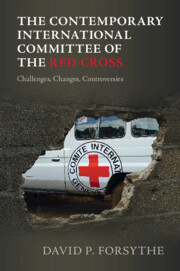Book contents
- The Contemporary International Committee of the Red Cross
- The Contemporary International Committee of the Red Cross
- Copyright page
- Dedication
- Contents
- Photographs
- Preface: Who and Why
- 1 The Contemporary ICRC and Its Critics
- 2 The ICRC and the Global Humanitarian System
- 3 History
- 4 History
- 5 The Red Cross Movement
- 6 The Red Cross Movement
- 7 ICRC Relations with Bern
- 8 ICRC Relations with Bern
- 9 Humanitarians and Business
- 10 Humanitarians and Business
- 11 Interpreting the Mandate
- 12 Interpreting the Mandate
- 13 Has the Traditional Focus Been Lost?
- 14 Has the Traditional Focus Been Lost?
- 15 ICRC Governance and Management
- 16 ICRC Governance and Management
- 17 Conclusion
- 18 Conclusion
- Epilogue
- Annex
- Index
12 - Interpreting the Mandate
Part II – Urban Violence and Migration
Published online by Cambridge University Press: 01 February 2024
- The Contemporary International Committee of the Red Cross
- The Contemporary International Committee of the Red Cross
- Copyright page
- Dedication
- Contents
- Photographs
- Preface: Who and Why
- 1 The Contemporary ICRC and Its Critics
- 2 The ICRC and the Global Humanitarian System
- 3 History
- 4 History
- 5 The Red Cross Movement
- 6 The Red Cross Movement
- 7 ICRC Relations with Bern
- 8 ICRC Relations with Bern
- 9 Humanitarians and Business
- 10 Humanitarians and Business
- 11 Interpreting the Mandate
- 12 Interpreting the Mandate
- 13 Has the Traditional Focus Been Lost?
- 14 Has the Traditional Focus Been Lost?
- 15 ICRC Governance and Management
- 16 ICRC Governance and Management
- 17 Conclusion
- 18 Conclusion
- Epilogue
- Annex
- Index
Summary
Continuing the discussion about how the contemporary ICRC interprets its core mandate, or how it exercises its right of initiative, this chapter starts with the subject of low-level urban violence. The author understands how the organization gets drawn into situations such as Rio de Janeiro, Brazil, and Port au Prince, Haiti, but is doubtful the organization can have much impact in very large and dysfunctional urban centers such as Karachi or Lagos. Major humanitarian needs certainly exist in violent urban areas, but whether the ICRC is the right agency for addressing them merits review. Likewise, on dealing with irregular migrants, the author understands the focus on detention issues but doubts some of the other existing activities should be systematically or consistently addressed by the ICRC. There are many other actors active on irregular migration. The ICRC does indeed run the risk of losing its special niche and becoming a very broad, all purpose, do-gooder agency, as some critics fear. A dilemma is how to be a good team player within the RC Movement but not fall victim to mission creep.
Keywords
- Type
- Chapter
- Information
- The Contemporary International Committee of the Red CrossChallenges, Changes, Controversies, pp. 250 - 265Publisher: Cambridge University PressPrint publication year: 2024

